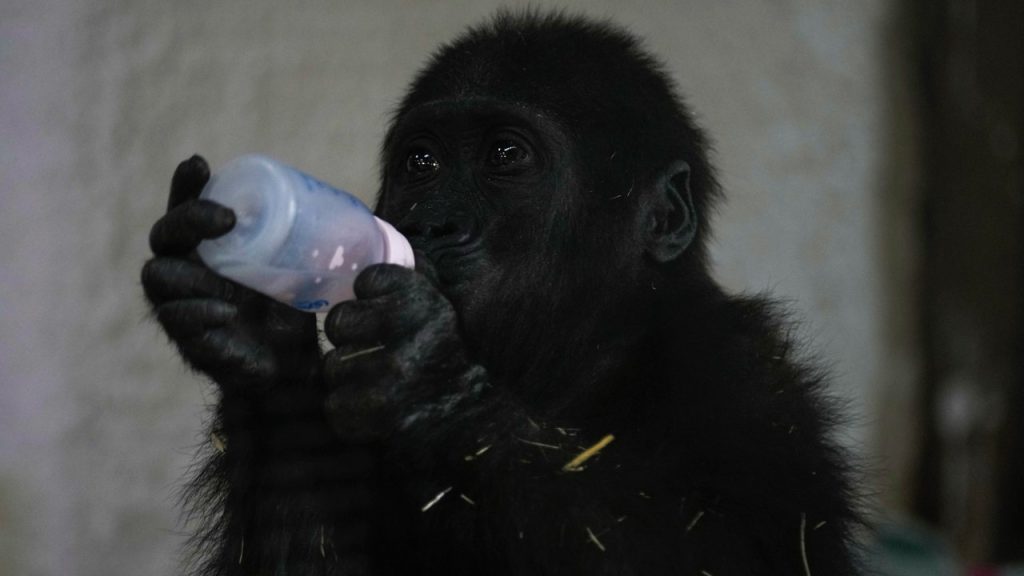The five-month-old gorilla, now named Zeytin, meaning “Olive,” was discovered last month during a routine inspection of a Turkish Airlines flight en route from Nigeria to Thailand. The young primate was found confined within a box in the aircraft’s cargo hold, raising immediate concerns about its welfare and the illicit wildlife trade. Upon discovery, Zeytin was taken into the care of Turkish authorities and subsequently placed at the Polonezkoy Zoo in Istanbul for observation and rehabilitation. His journey, from the cramped confines of a cargo crate to the relative safety of the zoo, highlights the persistent challenges in combating the illegal trafficking of endangered species.
Zeytin’s arrival at the Istanbul zoo marked the beginning of a delicate recovery process. Initially displaying signs of distress and timidity, the young gorilla has gradually adapted to his new environment. Veterinarians have closely monitored his health and development, noting improvements in his weight and overall demeanor. While Zeytin’s physical condition has steadily improved, the emotional scars of his ordeal remain a concern. His initial shyness and apprehension have gradually given way to a more playful and independent nature, suggesting a positive trajectory in his emotional recovery. This transition is a testament to the care and attention provided by the zoo staff.
The primary goal for Zeytin’s future, according to officials, is a return to his natural habitat. This, however, is contingent on ensuring a safe and suitable environment for his reintroduction. Fahrettin Ulu, regional director of Istanbul Nature Conservation and National Parks, emphasized the importance of establishing a secure location for Zeytin’s potential return, highlighting the need to protect him from further harm or exploitation. This cautious approach reflects the understanding that simply releasing Zeytin back into the wild without proper consideration could expose him to renewed risks, including poaching or habitat destruction.
The illegal wildlife trade, a global problem fueled by demand for exotic pets and animal products, poses a significant threat to endangered species like gorillas. Both western and eastern gorillas, native to the forests and mountains of central Africa, are classified as endangered, making the protection of individual animals like Zeytin all the more critical. The discovery of Zeytin in the cargo hold of an international flight underscores the complex networks involved in this illicit trade and the challenges faced by authorities in intercepting smuggled animals. The incident serves as a stark reminder of the vulnerability of these magnificent creatures and the need for continued efforts to dismantle the illegal wildlife trade.
Istanbul’s growing prominence as an international air hub has unfortunately made it a transit point for trafficked animals. The interception of Zeytin, along with other recent seizures of illegally transported animals at Istanbul airports, highlights the city’s role in this illicit trade. In October, for instance, customs officials discovered a shipment of young Nile crocodiles and monitor lizards concealed in a passenger’s luggage. These incidents underscore the need for increased vigilance and stricter enforcement of wildlife protection laws at airports and other points of entry.
The case of Zeytin serves as a poignant example of the challenges and complexities surrounding wildlife conservation. From his rescue from the confines of a cargo hold to his ongoing recovery at the Istanbul zoo, Zeytin’s story has captured public attention and highlighted the ongoing fight against the illegal wildlife trade. The future for Zeytin, while uncertain, carries with it the hope of a return to his natural habitat, a testament to the dedication of those working to protect endangered species and ensure their survival for future generations. His story is a reminder of the interconnectedness of global ecosystems and the importance of international cooperation in combating the illegal wildlife trade and preserving biodiversity.

